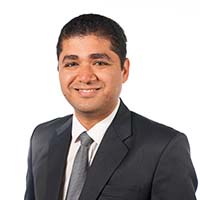As scary as it sounds, people can live a relatively normal life with congestive heart failure if they follow their care provider’s instructions to manage their condition.
A diagnosis of congestive heart failure, or CHF, means the heart muscle is not functioning normally. Either it is not pumping well or not relaxing normally after each pump.
“The dysfunction causes a lack of blood flow,” says Dr. Nitesh Ainani, a cardiologist at Tidelands Health Cardiology. “The body responds by slowing down the kidneys and holding onto water to compensate for the lack of blood volume, causing congestion in the organs and tissues of the body.”
What causes heart failure?
There are dozens of reasons people develop CHF, including structural defects in the heart, prior heart attack, atrial fibrillation, uncontrolled high blood pressure or certain viral infections. And there are risk factors that make people more likely to develop CHF, including:
Symptoms that signal heart failure
People with heart failure carry excess water throughout their bodies, which puts tremendous stress on their system. They can experience:
- Shortness of breath
- Swelling of the feet
- Trouble breathing while lying flat and nighttime wakefulness with breathing difficulty
- Tiredness and a lack of ability to perform daily activities
- Chest pain or palpitations
- Loss of appetite or upset stomach
Treatment options for heart failure
Sometimes the cause of heart failure, such as structural defect or an abnormal heart rhythm, can be addressed with surgery or other interventions. Often, however, the actual cause of the heart failure cannot be determined.
“The good news is there are effective medical treatments that reduce water in the body and strengthen the heart,” Dr. Ainani says.
Congestive heart failure medicines are often taken in combination to get the best results and include:
- Diuretic, commonly known as a water pill
- Cardiomyopathy medications
- Beta blockers
- ACE inhibitors, angiotensin receptor blockers and angiotensin receptor-neprilysin inhibitors
- Spironolactone
- SGLP-2 inhibitors
“We have made great incremental progress over the years with early diagnosis, medical therapies and disease management tools. The life expectancy for people with CHF has improved very significantly,” Dr. Ainani says. “It’s important to understand that CHF is chronic. It doesn’t go away.”
But, patients can learn to live with and manage it by:
- Take the prescribed medications
- Monitor and control blood pressure
- Eat a low-sodium diet because salty foods cause the body to retain water
- Monitor weight carefully for signs of water retention
Preventing congestive heart failure
The prevention strategies are the same ones we use to prevent many other chronic illnesses:
- Eat well
- Maintain a healthy weight
- Exercise
- Don’t smoke
- Limit alcohol
- Control other chronic diseases like diabetes and high blood pressure
“And if CHF runs in the family, see a physician, even if you don’t have any symptoms,” Dr. Ainani says. “We now have genetic testing available and can identify congestive heart failure risk and manage it more aggressively.”

Dr. Nitesh Ainani
Cardiologist at Tidelands Health Cardiology
Bio
Dr. Nitesh Ainani, who is accepting new patients, is a fellowship-trained cardiologist who practices at The Market Common, Murrells Inlet and Pawleys Island locations of Tidelands Health Cardiology.
Learn MoreMedical Education
Residency
University of Massachusetts Medical School, Internal Medicine
Fellowship
University of Massachusetts Medical School, Cardiovascular Diseases
University of Nebraska Medical Center, Interventional Cardiology
Meet the Expert
Dr. Nitesh Ainani
Dr. Nitesh Ainani, who is accepting new patients, is a fellowship-trained cardiologist who practices at The Market Common, Murrells Inlet and Pawleys Island locations of Tidelands Health Cardiology.




